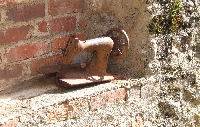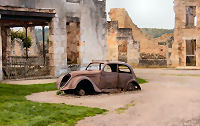Oradour-sur-Glane and the Nazi massacre there on 10th June 1944 (original) (raw)
The SS Panzer Division Das Reich, destroyed the French village of Oradour-sur-Glane on Saturday 10th June 1944 and today it is preserved In a Ruined State. This website describes the history, background and events leading up to the Nazi W.W.II. war-crime of the massacre of the inhabitants, of what is today in France, called the Martyr Village of Oradour-sur-Glane. This atrocity was carried out in the afternoon of Saturday 10th June 1944 by soldiers of the Der Führer Regiment of the 2nd Waffen-SS Panzer Division, Das Reich. On that day, without giving any explanation for their actions, they killed a total of 643 men, women and children, leaving only a few unintended survivors. They then destroyed the entire village of Oradour and to this day there is no universally accepted explanation for the massacre. In order to gain some lasting impressions from the tragedy, visitors to the ruins today are exhorted in both French and English to: "Souviens Toi--Remember!"
The narrative, In a Ruined State, gives a full description of what happened on the 10th June 1944 at Oradour and reviews all the current explanations offered by different authors for the attack on the village. In addition there are over 200 photographs in the Picture Gallery and much supporting information in the Appendices, including advice on how to get there and places to stay during a visit. If short of time, read the Summary and look at the Recommended viewing list, but for a fuller understanding, it is recommended to read all of, In a Ruined State. Additionally, the Appendices themselves are worth reading, as they contain much relevant detail about the background to the affair, biographical notes and details of what happened afterwards to those involved.
- Introduction
- Recommended viewing list
- Virtual Tour of Oradour
- In a Ruined State: the story of Oradour
- Timeline for Oradour-sur-Glane
- ****Picture Gallery**
- ****Appendices**
- ****Bibliography**
- Frequently asked questions (FAQ)
- Rank table for the Waffen-SS
- Notes on Language and terms used
- Latest News
- Site Map
- Additions and Updates
- Opening times for the ruins and the Centre de la Mémoire
- ****How to get there and places to stay**
Contact the author Michael Williams at ... michael@oradour.info
Note 1: In the literature, Oradour-sur-Glane is often spelled as, Oradour sur Glane (without the hyphens) and is frequently referred to simply as, Oradour, see the Oradours of France.
Note 2: The 10th of June 1944 was also the date for other war-crime killings by the Waffen-SS in France and elsewhere during W.W.II., see the 10th of June as a date in W.W.II. history.
Note 3: There is an annual ceremony in Oradour-sur-Glane to mark the anniversary of the massacre, see10th June commemoration ceremony.
Note 4: All spelling and date formatting on this website follows the British English conventions, see Dates, commonly misspelled words & accents.
Note 5: The Favicon for this website, which should be displayed in the address bar of your web browser, shows a cross of Lorraine superimposed on a standard French flag.
Note 6: This website includes information about a range of persons, places and organisations involved in the events at Oradour-sur-Glane, including:
a) French survivors who were present on the 10th of June 1944 and listed underDramatis Personae including, Robert Hébras, Mathieu Borie, Clément Broussaudir, Jean-Marcel Darthout, Yvon Roby, Hubert Desourteaux, Jacques Desourteaux, Jean Desourteaux, Roger Godfrin, the Pinède children, Pierre-Henri Poutaraud, and Marguerite Rouffanche.
b) German forces personnel involved, were those of themembers of the Der Führer Regiment of the 2nd SS-Panzer Division, Das Reichand include: Georg René Boos, Heinz Barth, Adolf Diekmann, Karl Gerlach, Otto Kahn, Helmut Kämpfe, Heinrich Lammerding, Johannes Seefried, Sylvester Stadler, Otto Weidinger and Heinz Werner.
c) Organisational information, such as, The Order of Battle of Das Reich in June 1944 is shown, as is an example of theSS rank structure and notes onHugo Sperrle, the Commander-in-Chief West of the German armed forces and whose orders were used to justify the attack. In addition there arenotes on language and terms used during the Nazi period.
d) As well as the various personnel listed above, there are basic notes on: Len Cotton, an RAF man shot down over France and sheltered in Oradour and Georges Guingouin a commander of the French Resistance whose capture of Helmut Kämpfe triggered the attack.
Note 7: All unvisited links are shown in Blue and change colour to Purple when visited. Note 8: Site optimised for a desktop PC with a 1280 x 1024 screen and the text size set to Medium (using Google Chrome, Microsoft Edge or Microsoft Internet Explorer).
Note 9:
Please report any broken links, or other errors of any kind to: michael@oradour.info
Note 10: GDPR Policy (General Data Protection Regulation) ... There are no cookies, spyware or advertisements of any kind at all on this website, it is informational only and not interactive, no personal data is held of visitors to this website.
© Michael Williams ... Friday 10th March 2000 ... this page was last updated on Thursday, 07 November 2024



